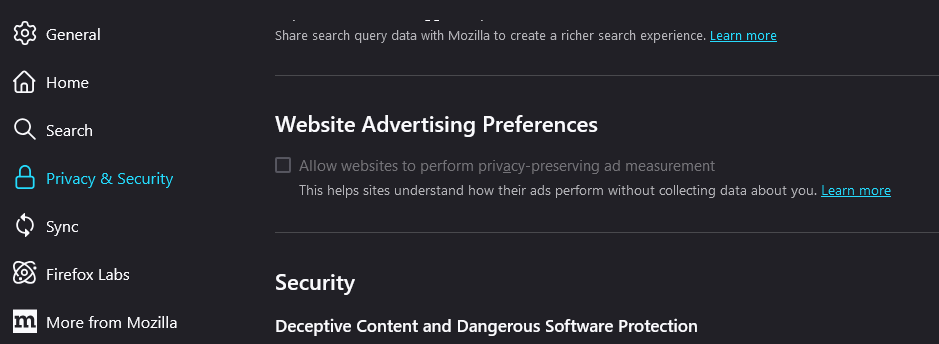Thatâ™s⠀really cool. � Ꭰо уо𝗎 𝗍һі𝗇𝗄 уо𝗎'ӏӏ со𝗇𝗍і𝗇𝗎е ᖯ𝗋о𝗐ѕі𝗇𝗀 ӏі𝗄е 𝗍һа𝗍?
zkfcfbzr
(Not an actual, like, punching him in the head beatdown.)
Look, let's not be picky here
Or a terrible one!
Their acquisition of Anonym was all about acquiring the feature this article is about, PPA. Anonym created PPA. In fact Anonym seems to have been created for the explicit purpose of creating this privacy-respecting system as an alternative to cross-site tracking cookies. I see no reason to doubt Mozilla's intentions here.
Yeah - I've actually softened my own stance since I wrote that paragraph near the end, too, I just didn't feel like editing a message that I claimed to have copy/pasted. While I still have no intention of enabling the feature in my install, that's out of pure spite for anything that could conceivably help an advertiser somewhere, even if it isn't at my expense. I do see value in the feature itself existing. While I think the industry is unlikely to abandon tracking cookies and swap to this system voluntarily, I could see certain governments eventually mandating such a change, if the feature proves robust enough.
I might even go as far as to agree that on-by-default is the better option for the feature's chances of success - but for new installs. When new features are added to existing installs in updates, particularly if those features are in the "Privacy & Security" section of the settings page, it would probably be better practice to ask the user to pick an option on the first boot after updating.
Copy/pasting my comment from the earlier thread on this that got deleted for misinformation
After reading about the actual feature (more), this seems like an absolutely gigantic non-issue. Like most anti-Mozilla stories end up being.
The whole thing is an experimental feature intended to replace the current privacy nightmare that is cross-site tracking cookies. As-implemented it's a way for advertisers to figure out things like "How many people who went to our site and purchased this product saw this ad we placed on another site?", but done in such a way that neither the website with the ad, nor the website with the product, nor Mozilla itself knows what any one specific user was doing.
The only thing I looked for but could not find an answer on one way or the other is if Mozilla is making any sort of profit from this system. I would guess no but actually have no idea.
There are definitely things that can be said about this feature, like "Fuck ad companies, it should be off by default" (my personal take), or "It's a pointless feature that's doomed to failure because it'll never provide ad companies with information as valuable as tracking cookies, so it'll never succeed in its goal to replace tracking cookies" (also my take). But the feature itself has virtually no privacy consequences whatsoever for anybody.
I'm absolutely convinced there's a coordinated anti-Firefox astroturfing campaign going on lately.
That feature (more) they've been getting all that negative press over for the past two days is an absolutely gigantic non-issue. Like most anti-Mozilla stories end up being.
The whole thing is an experimental feature intended to replace the current privacy nightmare that is cross-site tracking cookies. As-implemented it's a way for advertisers to figure out things like "How many people who went to our site and purchased this product saw this ad we placed on another site?", but done in such a way that neither the website with the ad, nor the website with the product, nor Mozilla itself knows what any one specific user was doing.
There are definitely things that can be said about this feature, like "Fuck ad companies, it should be off by default" (my personal take). But the feature itself has virtually no privacy consequences whatsoever for anybody, and Mozilla is at least trying to build a system that would legitimately improve the privacy situation on the internet created by companies like Google.
To anyone reading, don't do this. The real toggle is here.

After reading about the actual feature (more), this seems like an absolutely gigantic non-issue. Like most anti-Mozilla stories end up being.
The whole thing is an experimental feature intended to replace the current privacy nightmare that is cross-site tracking cookies. As-implemented it's a way for advertisers to figure out things like "How many people who went to our site and purchased this product saw this ad we placed on another site?", but done in such a way that neither the website with the ad, nor the website with the product, nor Mozilla itself knows what any one specific user was doing.
The only thing I looked for but could not find an answer on one way or the other is if Mozilla is making any sort of profit from this system. I would guess no but actually have no idea.
There are definitely things that can be said about this feature, like "Fuck ad companies, it should be off by default" (my personal take), or "It's a pointless feature that's doomed to failure because it'll never provide ad companies with information as valuable as tracking cookies, so it'll never succeed in its goal to replace tracking cookies" (also my take). But the feature itself has virtually no privacy consequences whatsoever for anybody.
I'm absolutely convinced there's a coordinated anti-Firefox astroturfing campaign going on lately.
Using uBlock Origin to get rid of the Youtube Shorts section of the sub feed was amazing for me. Are there other things you block too?
In fact, uBlock Origin is one of the officially recommended extensions by Mozilla
uBO Lite was incorrectly flagged as violating policy by someone at Mozilla, but rather than appeal that decision in any capacity at all, the developer just removed the add-on entirely without responding to Mozilla. The original decision was almost certainly just an error.